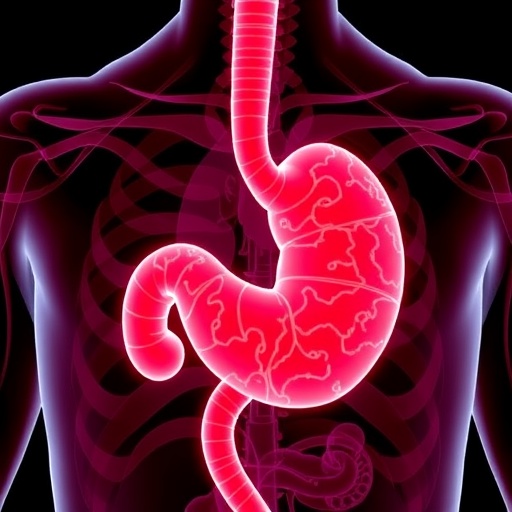Peritoneal metastasis in gastric cancer notoriously portends a grim prognosis due to its association with high rates of treatment resistance and recurrence. Traditional chemotherapeutic regimens have proven inadequate, necessitating novel, combinatorial strategies that can potentiate tumor regression while minimizing adverse events. The integration of immune checkpoint inhibitors like PD-1 blockers with established chemotherapy and targeted antiangiogenic agents such as bevacizumab opens new therapeutic vistas by simultaneously attacking tumor cells and modulating the tumor microenvironment.
The clinical trial in question enlisted ten patients diagnosed with gastric cancer accompanied by peritoneal metastasis, subdividing them into two arms predicated on the severity of ascites—an often complicating feature in such patients. Patients manifesting moderate to large ascites were allocated to receive intraperitoneal delivery of bevacizumab alongside albumin-bound paclitaxel, S-1 oral chemotherapy, and the PD-1 targeting antibody sintilimab. Conversely, those with absent or minimal ascites were administered bevacizumab intravenously in combination with the same systemic agents.
.adsslot_WPCNM4Ibe1{ width:728px !important; height:90px !important; }
@media (max-width:1199px) { .adsslot_WPCNM4Ibe1{ width:468px !important; height:60px !important; } }
@media (max-width:767px) { .adsslot_WPCNM4Ibe1{ width:320px !important; height:50px !important; } }
ADVERTISEMENT
This stratified therapeutic framework leverages the pharmacokinetic advantages inherent to intraperitoneal administration, ensuring heightened local drug concentrations within the peritoneal cavity, thereby maximizing direct tumoricidal effects on peritoneal implants and malignant ascitic cells. Intravenous administration, however, remains indispensable for systemic disease control and is preferred in patients with minimal peritoneal fluid accumulation.
Efficacy outcomes were rigorously evaluated through progression-free survival (PFS) and overall survival (OS) metrics, which revealed encouraging signals. The median PFS in the intraperitoneal arm was reported at 5.7 months, while the intravenous arm exhibited a longer median PFS of 9.07 months. Overall survival medians were observed at 8.43 months and 11.23 months for intraperitoneal and intravenous arms respectively, underscoring a trend toward enhanced survival benefits with systemic delivery in this limited cohort.
Safety profiles were also meticulously monitored, with Grade 3/4 adverse events occurring in 25% of patients receiving intraperitoneal bevacizumab and 16.7% in those receiving intravenous administration. These findings denote a manageable toxicity landscape, bolstering the feasibility of this combination regimen in a population notoriously vulnerable to treatment-related complications due to their advanced disease status.
At the molecular nexus, PD-1 inhibitors reinvigorate exhausted cytotoxic T-cells, restoring antitumor immunity often suppressed in the tumor microenvironment of advanced gastric cancer. Concurrently, bevacizumab, a monoclonal antibody targeting vascular endothelial growth factor (VEGF), impedes angiogenesis, thereby curtailing tumor nourishment and metastatic potential. This dual mechanistic attack, supported by cytotoxic chemotherapies, amplifies overall antineoplastic efficacy.
This study’s design as an open-label, two-arm pilot trial was pivotal in generating early clinical insights yet reflects limitations inherent to small sample sizes and lack of randomization. Nonetheless, its findings pave the way for larger, controlled trials which might definitively establish optimal administration routes and elucidate potential biomarkers predictive of response to this tripartite regimen.
Importantly, the trial was registered at the Chinese Clinical Trial Registry, underscoring a commitment to transparent, ethical research practices. This framework ensures that emerging data contributes meaningfully to the global scientific discourse on gastric cancer therapeutics.
Looking ahead, integrating immunotherapeutic regimens with traditional cytotoxic agents is increasingly recognized as a paradigm-shifting approach, especially in malignancies characterized by immunosuppressive niches and complex metastatic patterns such as gastric cancer with peritoneal dissemination. This study underscores the critical importance of personalized therapeutic strategies tailored not only to disease phenotype but also microenvironmental factors like ascitic burden.
The implications of this research extend beyond immediate clinical application; they beckon a deeper exploration into the interplay between chemotherapy, immunotherapy, and antiangiogenic strategies within the peritoneal tumor microenvironment. Understanding this crosstalk may identify novel targets and refine combination modalities further.
In summary, the investigational regimen of albumin-bound paclitaxel and S-1 chemotherapy, combined with PD-1 blockade and tailored bevacizumab administration, offers a beacon of hope for a patient subset long facing dismal prognosis. While preliminary, these encouraging results illuminate a path toward more efficacious, tolerable treatment paradigms for gastric cancer patients burdened by peritoneal metastasis.
Continued research efforts must validate and extend these findings, potentially integrating cutting-edge biomarkers and imaging modalities to monitor therapeutic responses dynamically. Such advances could ultimately translate into increased survival rates and improved quality of life for patients confronting this formidable disease.
This study exemplifies how convergent biomedical innovations—chemotherapy, immunotherapy, and targeted therapy—can be harmonized to tackle complex oncological challenges. As the oncology community stands on the cusp of transformative change, such pioneering clinical trials offer invaluable insights and hope.
Subject of Research: Safety and efficacy of combining systemic chemotherapy with PD-1 inhibitors and intravenous or intraperitoneal bevacizumab in treating gastric cancer with peritoneal metastasis.
Article Title: Safety and efficacy of systemic chemotherapy plus PD-1 inhibitor in combination with intravenous or intraperitoneal bevacizumab in gastric cancer with peritoneal metastasis.
Article References:
Ma, Y., Li, Y., Lin, Z. et al. Safety and efficacy of systemic chemotherapy plus PD-1 inhibitor in combination with intravenous or intraperitoneal bevacizumab in gastric cancer with peritoneal metastasis. BMC Cancer 25, 1010 (2025). https://doi.org/10.1186/s12885-025-14206-9
Image Credits: Scienmag.com
DOI: https://doi.org/10.1186/s12885-025-14206-9
Tags: antiangiogenic agents in oncologyascites in gastric cancer patientsbevacizumab for gastric cancerchemotherapy and PD-1 combination therapyclinical trials for gastric cancergastric cancer treatment advancementsimmune checkpoint blockade in cancerimproving outcomes in gastric cancer therapyintraperitoneal chemotherapy strategiesnovel cancer treatment approachesperitoneal metastasis managementtargeted therapy for metastatic cancer





